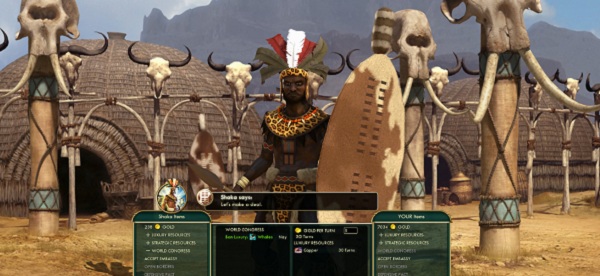Wondrous: The Civilization V Community Patch Project
Reconstructing Civilization
The last big official update to Civilization V [official site] came in 2013 with its second large expansion, Brave New World. Three years later, and almost six years after the game’s original release, there’s another big new release expected, but it’s not an official expansion. It’s the Community Patch Project (CPP; to be named Vox Populi on release), a community-made mod that overhauls and improves a majority of the game’s systems in an attempt to make Civilization V the best game it possibly can be.
I’m relatively new to the patch myself, having only discovered it in late 2015 thanks to the YouTuber Arumba, but by that time it had already been in the works for over a year. How did it come about? I spoke to CivFanatics forum user Gazebo, largely considered the face of the project.
“Back in 2014, I started a wish list of things I felt I had the c++ competency to design. The biggest features I wanted to implement were resource monopolies, late-game corporations, a new happiness system, and a random events system. Together, these aspects really do feel like an official expansion of civ. I also wanted the project to incorporate as many community suggestions, ideas, and criticisms as possible, as the combined brain power of the community is much more than I could ever hope to muster on my own!”
What the community have created is nothing short of amazing; a complete overhaul of Civilization V that completely revived my interest in the game long after I'd drifted away from the original. Although I can’t possibly go through every little thing that’s been changed (a complete changelog and guide can be found here) I’m going to at least give you the rundown of the major changes, the reason they’ve completely reinvigorated Civilization V for me, and how the game feels with the Community Patch Project installed.
Wants and Needs: The New Happiness System
The biggest change to the CPP is the one that best summarises how it feels to play. The new happiness system is so much more organic, in depth and natural, and that feel ties into how the rest of the mod plays as well.
The old, static happiness modifiers are completely done away with and replaced with a system of needs which are evaluated on a city-by-city basis. Each city demands a certain amount of yields per population, and if they don’t get enough, they generate unhappiness based on how much they’re missing. This unhappiness feeds back into the global happiness system of course, and so multiple unhappy cities without enough happiness modifiers will lead to an unhappy empire.
The way the needs are named, though, feels more organic, and makes the system more than just numbers. Your citizens don’t cry out for “more culture” or “more science”, they complain about “boredom” and “illiteracy”. Got a city with a high illiteracy rate? Better build some Libraries and Universities. Citizens getting bored? Entertain them in the Amphitheater!
There are other sources of unhappiness too, such as being isolated from the capital (no city connections) and Religious Unrest (not enough religious followers), so it’s not just about managing a few percentages, it’s about actually making sure a city has everything it needs. Or as close to the ideal as possible.
I haven’t quite got the happiness system figured out yet. I understand it, mostly, but my empire always seems to be in some minor state of unhappiness due to a lack of money, or defenses, or this or that. I think mostly it punishes me for over-specialising, ignoring culture in favour of science for example, and that’s great! Now I have to choose between happiness and specialisation in a way that makes me feel less like a strategy gamer and more like a ruler.
Ignoring your population's state of happiness isn’t wise. Besides the revolts that can occur at severe levels of unhappiness, even minor unhappiness leads to a loss of science and gold, while your units take combat penalties due to low morale. On the flip side, positive happiness can actually boost these numbers, so letting yourself drop too low is a double loss of resources. A wise ruler makes sure their citizens’ needs are met, or pays the consequences.
New Uniques for Everyone (Except Poland)
The more immediately exciting changes from the CPP are the adjustments made to each of the civilizations. I always thought that the way Civilization V handled Unique Abilities (UA) was exciting. Rather than the trait system of earlier Civ games, each Civilization now got to be truly unique with abilities based on its historical position in the world.
Unfortunately, a lot of the UAs ended up being either too one-dimensional, arbitrary or just plain unhelpful. Although you could often see what the intent behind them was, many required very specific scenarios to be worthwhile, or shoehorned you into strategies that you either weren’t comfortable with, or just weren’t possible given your position in the world. The CPP overhauls basically all of that, making every UA dynamic, interesting and almost always relevant.
The one exception is Poland, whose ability remains untouched. Poland was used almost as inspiration for the rest of the overhauls, and you can see its benefits reflected in almost everyone else’s new uniques. Poland’s extra social policy per era is relevant no matter what your starting position, dynamic enough to allow you to approach any victory condition, simple to use and effective throughout the entire game. Now every civilization can say the same.
A large reason that the CPP feels so fresh is that it allows you to diversify without punishing you for the decisions you make. In fact, as the happiness system proves, it even punishes you a little for not diversifying. Everything is tied to everything else. Now there are multiple paths to the same victory, and good reasons to invest in almost anything. The new unique abilities are great at capturing that sensibility while still being genuinely unique, interesting and diverse.
As well as the changes to abilities, each civilization has been adjusted to make sure that it has at least one Unique Unit and either a Unique Building or Improvement. A lot of the old one-dimensional civilizations were made even more one-dimensional due to lack of a unique building. If you aren’t going to war, a special unit is kind of useless, and having two is even worse. Now, if you're a pacifist, you’ll still have something to build that should help you out in some way.
Of course, many of these units, buildings and improvements have been adjusted to match the feel of the CPP, so they’re diverse by themselves, and often help create a secondary goal for each civilization. Even if your unique ability hasn’t come into play much, your unique building or improvement might help catapult you towards your victory condition if you use it right.
Victory Conditions
The victory conditions themselves haven’t been overhauled (much), but winning the game certainly feels like a very different task nowadays. The focus on generalisation helps a lot with that. It’s not that you don’t have to specialise to win any more. Rather, you can’t specialise as much so victory comes less quickly and often with less overwhelming unbalance as in the base game. Gone are the days of launching a rocket to Alpha Centauri without ever researching the Rocketry technology, or buying out all the City States just before the game-winning UN Diplomatic Leader vote.
The technologies needed for the science victory come right at the end of the tech tree, so you actually need to research everything in order to win through science. Tourism comes from a wider variety of sources, and trickles in throughout the game, giving you a chance to be ready for a sightseeing revolution when tourism really kicks off in the Modern era. The World Congress requires more steps to reach the Diplomatic Victory, not to mention that city state diplomacy is completely overhauled. Resistance to your military becomes naturally stronger the more enemy capitals you hold.
These aren’t the reasons that victory in the CPP feels so different than the base game though. They’re just balance changes. Victory itself is changed by the path to victory. You’re no longer tied down, from the beginning of the game, to focusing on one specific victory type and then half-praying that you have the tools you need to reach it. Some civilizations will still naturally favour one victory or another, but there’s enough variety in their abilities - and in the gameplay, tech tree, buildings and other options available - to offer you multiple paths to victory every game. Sometimes you won’t even need to decide what you’re doing until much later in the game, because you’re naturally hedging your bets anyway.
This is core to what makes the CPP special. You’re no longer playing a game with a specific, pre-planned path to victory. You’re building and managing an empire, steering it roughly in the direction you need it to go but ultimately unsure of what exactly will happen. Victory isn’t just a choice you make, it’s an organic growth of your civilization, a natural conclusion to your story. This is exactly what Civilization has always meant to me. With the Community Patch Project, Civilization V finally reflects that, bringing flexibility to your rule.
Those major changes to the way the game functions are backed up by extensive changes to AI and balance that tweak just about every element of the game.
The Community Patch Project is unofficial and entirely fan made. It’s still undergoing tweaks and changes, but it’s hoped that it will be considered complete and finalised as Civilization V: Vox Populis this summer. If you want to try it out in the meantime, head on over to the Community Patch Project forum on Civ Fanatics. To run it you'll need Civ V with both major expansions (Gods and Kings, Brave New World), all of the leader DLC and the Ancient Wonders DLC.















